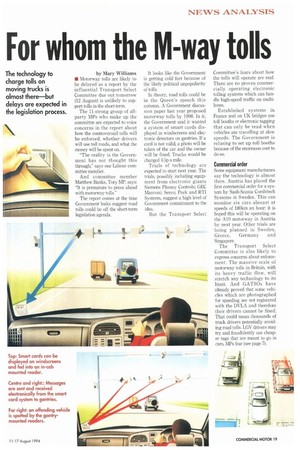For whom the 11-way tolls
Page 19

If you've noticed an error in this article please click here to report it so we can fix it.
by Mary Williams • Motorway tolls are likely to be delayed as a report by the influential Transport Select Committee due out tomorrow (12 August) is unlikely to support tolls in the short-term.
The 11-strong group of allparty MPs who make up the committee are expected to voice concerns in the report about how the controversial tolls will be enforced, whether drivers will use toll roads, and what the money will be spent on.
"The reality is the Government has not thought this through," says one Labour committee member.
And committee member Matthew Banks, Tory MP, says: "It is premature to press ahead with motorway tolls."
The report comes at the time Government leaks suggest road tolls could be off the short-term legislation agenda. It looks like the Government is getting cold feet because of the likely political unpopularity of tolls.
In theory, road tolls could be in the Queen's speech this autumn. A Government discussion paper last year proposed motorway tolls by 1998. In it, the Government said it wanted a system of smart cards displayed in windscreens and electronic detectors on gantries. If a card is not valid, a photo will be taken of the car and the owner will be fined. Trucks would be charged 4.5p a mile.
Trials of technology are expected to start next year. The trials, possibly including equipment from electronic giants Siemens Plessey Controls; GEC Marconi; Serco; Peek and RTI Systems, suggest a high level of Government commitment to the idea.
But the Transport Select Committee's fears about how the tolls will operate are real. There are no proven commercially operating electronic tolling systems which can handle high-speed traffic on multilanes.
Established systems in France and on UK bridges use toll booths or electronic tagging that can only be read when vehicles are travelling at slow speeds. The Government is refusing to set up toll booths because of the enormous cost to do so.
Commercial order Some equipment manufacturers say the technology is almost there. Austria has placed the first commercial order for a system by Saab-Scania Combitech Systems in Sweden. This can monitor six cars abreast at speeds of 180km an hour: it is hoped this will be operating on the A10 motorway in Austria by next year. Other trials are being planned in Sweden, Greece, Germany and Singapore.
The Transport Select Committee is also likely to express concerns about enforcement. The massive scale of motorway tolls in Britain, with its heavy traffic flow, will stretch any technology to its limit. And GATSOs have already proved that some vehicles which are photographed for speeding are not registered with the DVLA and therefore their drivers cannot be fined. That could mean thousands of truck drivers potentially avoiding road tolls. LGV drivers may try and fraudulently use cheaper tags that are meant to go in cars, MPs fear (see page 7).














































































